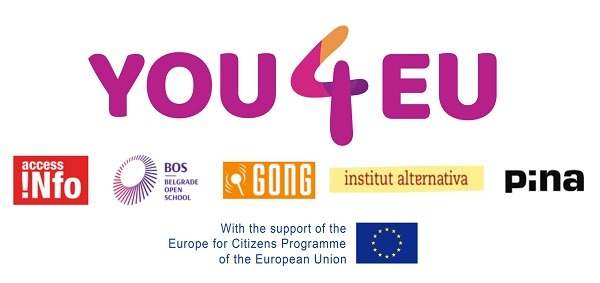Madrid, 14 February 2020 – Citizens across Europe need better access to information to participate in decision-making processes at European, national, and local level. This is one of the main recommendations by Access Info Europe and partners in the publication ‘YOU4EU Policy Recommendations’, presented in Brussels on 6 February 2020 at the high-level conference “Engaging citizens for good governance in Cohesion Policy”.
The publication is based on extensive research in five countries by Access Info Europe in Spain, Belgrade Open School in Serbia, Gong in Croatia, Institute Alternative in Montenegro and PiNA in Slovenia. The organisations found that European Institutions do not communicate sufficiently well with citizens and fail to use adequate channels, such as social media, to reach a younger audience.
Another finding was that when citizens try to contact with policy makers and elected representative using channel such as social media, the messages often go ignored and unanswered.
A key recommendation is that EU institutions use social media to share not only basic and easy-to-understand information, but to disseminate substantive information and documents. Failing this, citizens are forced to dive into the European Union’s websites, where information is hard to find. There also needs to be a greater responsiveness, adapting to the timeframes that the public is used to in a world of instantaneous news and comment.
“To reach the public and counter Euroscepticism, EU institutions need to jump into 2020. We found that citizens in the EU and in accession countries are keen to better understand the EU and to engage, but are blocked because there is a lack of effective participatory channels to have a genuine say in decision making,” commented Helen Darbishire, Executive Director of Access Info Europe.
“We are also concerned by the backlash against transparency, exemplified by the Montenegrin government’s attempts to change the Law on Free Access to Information in a way that would drastically worsen it. The EU needs to ensure that transparency standards are upheld,” added Darbishire.
The ‘YOU4EU Policy Recommendations’ also contains recommendations for national governments and civil society:
- EU institutions should increase: transparency in decision-making, financial transparency so citizens know how EU funds are allocated and spent, and lobby transparency, setting up a mandatory Lobby Register. The EU should also establish minimum standards on the right to access to information for both EU and accession countries.
- National governments should strengthen Information Commissioners and ensure that sanctions for non-compliance with national access to information laws are established. National governments should sufficiently train public officials, members of parliaments and judges to guarantee an effective exercise of the right of access to information.
- Civil society should train citizens on active participation and press governments to use and develop e-participation tools.
The ‘YOU4EU – Citizen Participation 2.0’ project also mapped the questions that the public has about the European Union, collected in the publication ‘50 Questions from YOU to the EU’. In addition, a contest was held to develop a digital tool for civic participation (won by NGO CIECODE), and debates were organised in Croatia, Montenegro, Serbia and Slovenia to discuss the main issues of concern to citizens with respect to transparency and participation and to examine and share best practices.
Read the publication ‘YOU4EU Policy Recommendations’ ![]()
For more information, please contact:
Helen Darbishire, Executive Director | Access Info Europe
helen@access-info.org +34 637 226 609
Paula Domínguez, Communications Officer | Access Info Europe
paula@access-info.org +34 913 656 558

